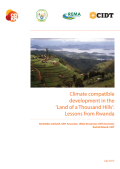
In the last decade, Rwanda has emerged as a leader in Africa for its efforts to integrate climate resilience and green growth into development planning and finance. This working paper charts some of the steps the Government of Rwanda has taken to become a leader in this area, namely:
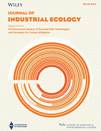
Reductions in the greenhouse gas (GHG) intensity of passenger and freight transportation are possible through adoption of fuel-saving technologies, demand switching between modes, and large-scale electrification of fleets, in addition to other actions. In this study, future scenarios to 2030 and 2050 are the basis for assessment of GHG reduction potentials for major passenger and freight modes (automobiles, buses, trains, aircraft, and oceangoing vessels) across eight regions of the world. New fuel-saving technologies can significantly reduce the life-cycle GHG footprint of both passenger and freight vehicles, but not uniformly worldwide. Countries outside of the Organization for Economic Cooperation and Development (OECD) lag behind OECD countries in GHG reduction potentials for all modes but oceangoing vessels owing to a combination of slower adoption of fuel-saving technologies and a slower decarbonization of electricity generation and other processes. The reduction of GHG intensity will occur more slowly for freight modes than for passenger modes.
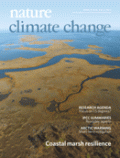
In the field of adaptation governance research, current discussion on the barriers to adaptation shows that theoretical explanations for why institutions emerge and how they enable or constrain adaptation are underdeveloped. In this Perspective, the authors show that there is a significant opportunity to advance the understanding of adaptation governance by integrating insights that have been developed in the extensive commons literature on the institutions that work to overcome social conflicts or dilemmas. 'Realist-materialist' approaches to understanding such collective action are particularly valuable to adaptation governance research because they emphasize how biophysical conditions give rise to certain types of social dilemma. Climate change affects these biophysical conditions, and thus may alter dilemmas or create new ones. Based on realist-materialist reasoning, this Perspective describes six types of dilemma, illustrates each with a case from the adaptation literature and draws on insights from the commons literature regarding relevant contextual conditions and effective policy instruments for overcoming social dilemmas.
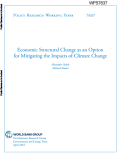
Improving the resilience of the economy in the face of uncertain climate change damages involves irreversible investments to scale up new technologies that are less vulnerable to the effects of climate change. The benefit of having such options includes the avoided welfare cost of diverting consumption to scaling up the new technology after production possibilities have been diminished by climate change impacts. This needs to be balanced against the upfront cost of scaling up a technology that is potentially less productive than incumbent technologies. The paper uses a real options approach to investigate this trade-off, based on numerical simulation of a multi-period model of economic growth and climate change impacts that includes a one-time cost associated with scaling up the alternative technology. The value of the option provided by investment in the more resilient technology depends on the ex-ante volatility of climate change damages, as well as how rapidly climate change degrades the productivity of the economy's established technology.
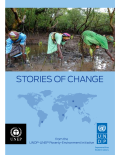
This publication brings together selected Stories of Change which we will hopefully catalyze and motivate governments, stakeholders, and the international development community at large to invest in, and support, poverty-environment mainstreaming across the globe as one element of the transition to an inclusive, green economy. Poverty-environment mainstreaming is a compelling and effective approach and set of tools and capacities for driving the institutional change which can –and ultimately will - deliver sustainable development.
These Stories of Change showcase that innovative and flexible ways of working can be the norm rather than the exception.
The booklet includes the following chapters:
